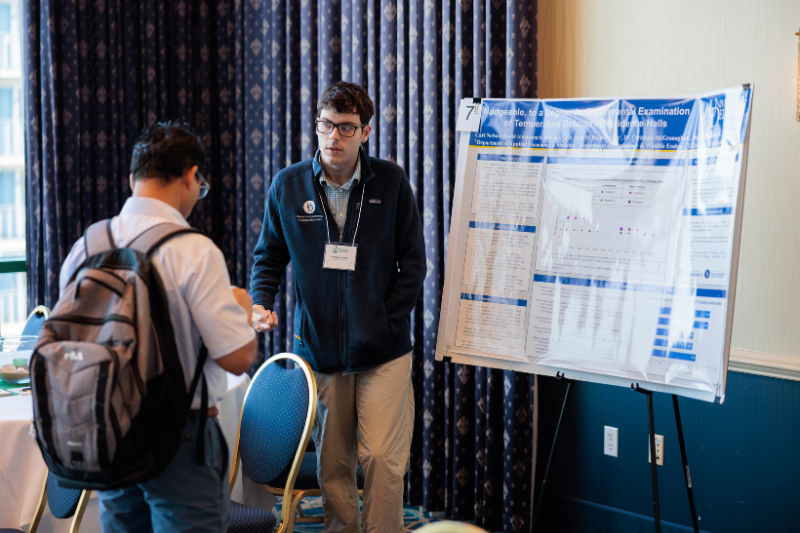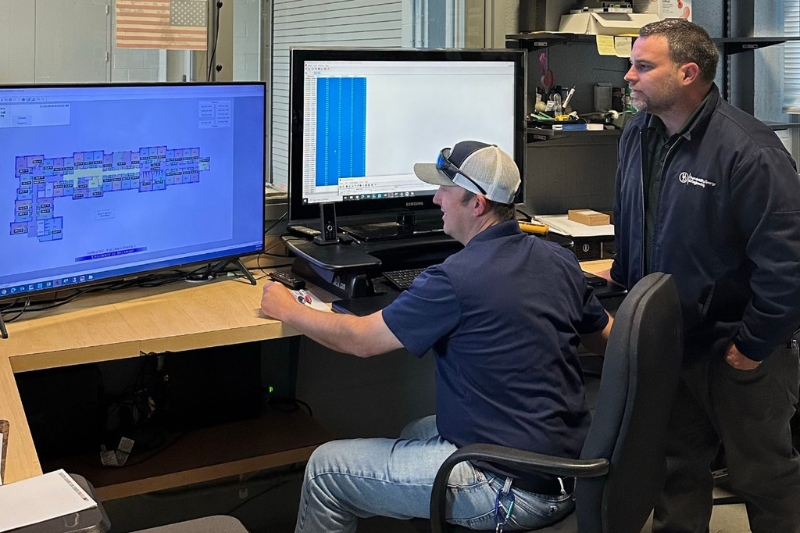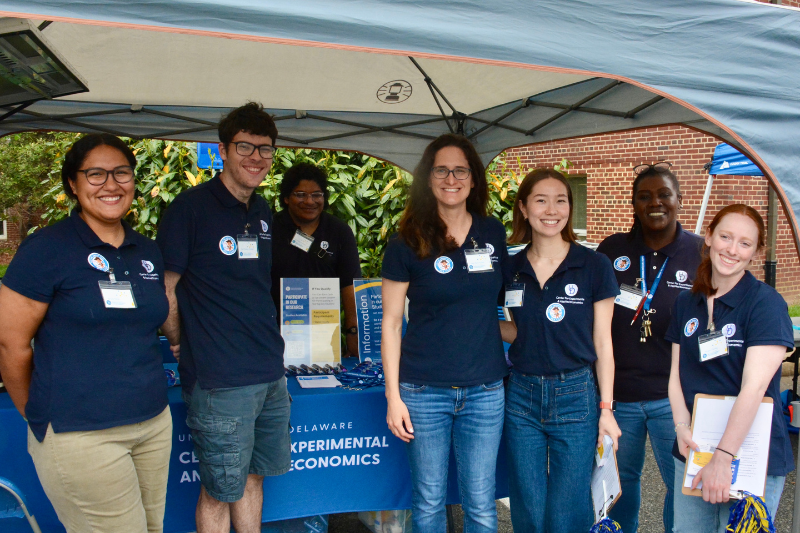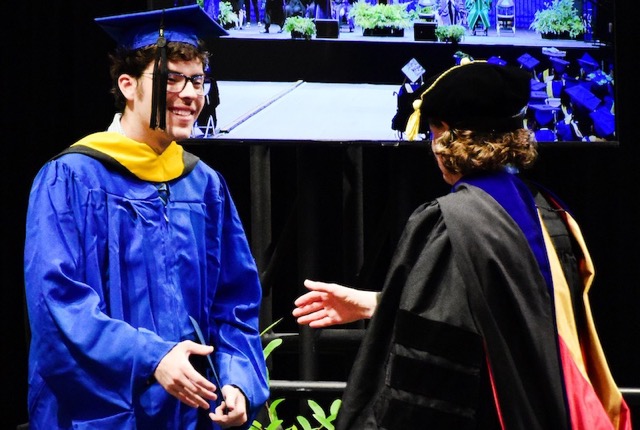
Category: Applied Economics and Statistics

Small changes, big impact
October 21, 2025 Written by Nya Wynn | Photos by Evan Krape and Katie Young, courtesy of Carl Nelson-Poteet
Carl Nelson-Poteet, alumnus of UD’s master's of Water Science and Policy Program, improves campus sustainability efforts through research and service
As an undergraduate energy and environmental policy and environmental studies double major at the University of Delaware, Carl Nelson-Poteet began working as a teaching assistant for the Department of Applied Economics and Statistics (APEC) and eventually as a research assistant for Leah Palm-Forster, associate professor of applied economics, on a groundwater management project for irrigation and agriculture.
His experiences solidified his decision to continue at UD for his master’s degree in Water Science and Policy working with Palm-Forster on a project investigating how behaviors surrounding temperature defaults can impact energy and water consumption.
“Water is a very important resource, and it's scarce,” Nelson-Poteet said. “As water usage continues to grow with the population and climate change continues to progress, water is only becoming more scarce. So it’s very important to understand the underlying reasons why people act the way they do and consume the way they do with water.”
Nelson-Poteet’s thesis research focused on investigating how resident behavior in residence halls on the UD campus can impact the energy consumption used for cooling and heating. Finding ways to reduce the energy needed to maintain temperature would, in turn, also reduce water consumption, as water is heavily involved in the production of electricity.
“He wanted to understand the behavioral drivers of how people make decisions, knowing that when you set a temperature default on a thermostat, often that can influence behavior,” Palm-Forster said.

Working with UD facilities, Nelson-Poteet tested different thermostat temperature defaults in residence halls on campus and assessed whether the residents would stick with those energy-efficient defaults or move away from them.
According to Nelson-Poteet, by pushing the default temperature setting two degrees cooler (when in heating mode), people tended to stay at or below the default. He also explained that most of the students in the study did not realize any difference in the temperature during the study.
“We found very strong treatment effects between treatment groups compared to the control, so we’re confident that what we were doing had an effect,” Nelson-Poteet said. “The average sentiment of a resident affected was neutral to slightly positive, we saw a very small subsection of students having strong negative feelings about this.”
In the survey they sent to residents after the conclusion of the study, the majority of students expressed that they felt the benefits of lowering temperature defaults—saving energy and water consumption—were greater than the cost—living a few degrees cooler during colder months.
“We definitely want to be more cautious when we're talking about generalizing the energy findings because that's going to depend so heavily on climate, type of building, type of A/C unit, things like that,” Nelson-Poteet said. “But we found that, at UD, unit energy consumption decreased by about 38 percent.”
For his dedication to research and service throughout his time at UD, Nelson-Poteet was awarded the William J. Benton Graduate Student Award this year, an accolade given to graduate students who excel in research, academics and service.

However, Nelson-Poteet was not the only award-winner on this project.
The Residence Hall Energy Study Implementation Team received the Distinguished Team Staff Excellence Award for their dedication to the project, development of an innovative energy use equation and manual adjustment of the temperature settings of close to 600 residence hall rooms.
Among the awardees were Brian Kelley, building systems tech team leader with Facilities Building Maintenance and Ops, and Joe Collins, facilities engineer with UD’s Sustainability, Energy & Engineering department.
“Joe and Brian were both very involved in helping with designs and were very patient walking me through all the intricacies of the HVAC systems,” Nelson-Poteet said. “One of the original hiccups we had in design was that there was no way to automate the temperature changes, so every morning for the entire month of October and February Brian would do the adjustments by hand. This literally would not have happened without them.”
In addition to his masters thesis research, Nelson-Poteet published a paper on research that he began as an undergraduate titled Dare to Experiment. That project surveyed undergraduate research assistants and how they felt supported by student research.
“The Dare to Experiment paper was cool because we had a student lead author of a paper on student research experiences,” Palm-Forster said. “He was able to pull from his own insights and experience as an undergraduate researcher to design a survey to get information from those researchers and really be thoughtful about how undergraduate research supports a student, as well as supporting the research.”
This involvement with undergraduate research led to Nelson-Poteet’s role in the Center for Experimental and Applied Economics (CEAE) mentoring network. He serves as a “mentor in residence,” offering time where students can come ask for guidance and learn about academic and career opportunities.
Working with organizations, like the Office of Sustainability and Reduction in Motion, and mentoring other students is just as important as the research when it comes to sustainability efforts.
“Carl’s been instrumental in both giving his time to mentor other students, but also offering input and guidance for the structure of the program,” Palm-Forster said. “He had a lot of ideas to get students engaged in programming and in sessions that would be valuable and meaningful.”
Through all these experiences, Nelson-Poteet aims to demonstrate the value of sustainability research. As a graduate student intern for UD’s Office of Sustainability, he works on sustainability reporting, putting together the University's Sustainability Tracking, Assessment & Rating System (STARS). This assessment is a way for colleges and universities to measure their sustainability performance, but it requires considerable data collection and analysis on Nelson-Poteet’s end.
“I did a greenhouse gas inventory, totaling up all the different emission sources that the University has and quantifying it in terms of carbon,” Nelson-Poteet said. “I just recently ran a transportation survey asking people about their commuting methods and if they'd be interested in using bikes or the campus buses.”

He also worked on ramping up the graduation gown recycling program, where graduating Blue Hens donate their used caps and gowns for future graduates to avoid regalia going immediately to a landfill.
Nelson-Poteet’s master’s thesis research can be applied to evaluate sustainability efforts at other colleges and universities, while his work with the Office of Sustainability and the CEAE mentoring network helps to keep students interested in sustainability.
“In terms of my thesis, it's pretty much a one-to-one for any university that has a similar temperature setup in their dorms,” Nelson-Poteet said. “Basically, if you periodically bump temperature defaults one to two degrees cooler in the winter, that'll save you some energy.”
Since graduation, Nelson-Poteet has begun working as the sustainability facilitator at Reduction in Motion, a small waste consulting firm.
“Working with organizations, like the Office of Sustainability and Reduction in Motion, and mentoring other students is just as important as the research when it comes to sustainability efforts,” Nelson-Poteet said. “That’s how we continue to advance and become a more sustainable society.”

